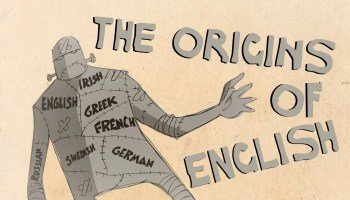THE MOST DIVERSE LANGUAGE ON EARTH

INTRODUCTION
English is a West Germanic language of the Indo-European language family, originally spoken by the inhabitants of early medieval England. It is named after the Angles, one of the ancient Germanic peoples that migrated to the area of Great Britain that later took their name, England. Both names derive from Anglia, a peninsula on the Baltic Sea which is not to be confused with East Anglia, the Eastern part of England which comprises the counties of Norfolk, Suffolk and Essex. English is most closely related to Frisian and Low Saxon, while its vocabulary has been significantly influenced by other Germanic languages, particularly Old Norse, as well as Latin and French.
A BRIEF HISTORY
It was on the 28th of September in 1066 that William the Conqueror of Normandy arrived on British soil. He defeated the British in the Battle of Hastings and on Christmas Day he was crowned King of England in Westminster Abby.
What nobody knew at the time was how much this would affect the English language. The British back then were speaking a combination of Saxon and Old Norse. The Normans spoke French. Over time, the languages blended and as a result English became a language incredibly rich in synonyms.
Because the French speakers were aristocrats the French words often became the fancy words for things. The Normans gave us “mansion”; the Saxons gave us “house.” The Normans gave us “beef”; the Saxons gave us “cow.”
IS IT GOOD OR BAD FOR ENGLISH BEING DIVERSE?
The English language has gone on accepting additions to its vocabulary ever since, and it now contains more than a million words, making it one of the most diverse languages on Earth. Writers have been arguing for hundreds of years about whether this is a good thing.
The critic Cyril Connolly wrote, “The English language is like a broad river … being polluted by a string of refuse-barges tipping out their muck.” But Walt Whitman said, “The English language is the accretion and growth of every dialect, race, and range of time, and is both the free and compacted composition of all.” And the poet Derek Walcott said, “The English language is nobody’s special property. It is the property of the imagination: it is the property of the language itself.”
Thanks For Reading.
Interesante relato como toda lengua es la suma de otras más que la van enriqueciendo y transformando, y quienes hacen uso de ella la van modificando.
Thank you
Congratulations @boldase! You have completed the following achievement on the Hive blockchain and have been rewarded with new badge(s) :
Your next target is to reach 50 replies.
You can view your badges on your board and compare yourself to others in the Ranking
If you no longer want to receive notifications, reply to this comment with the word
STOPCheck out the last post from @hivebuzz: